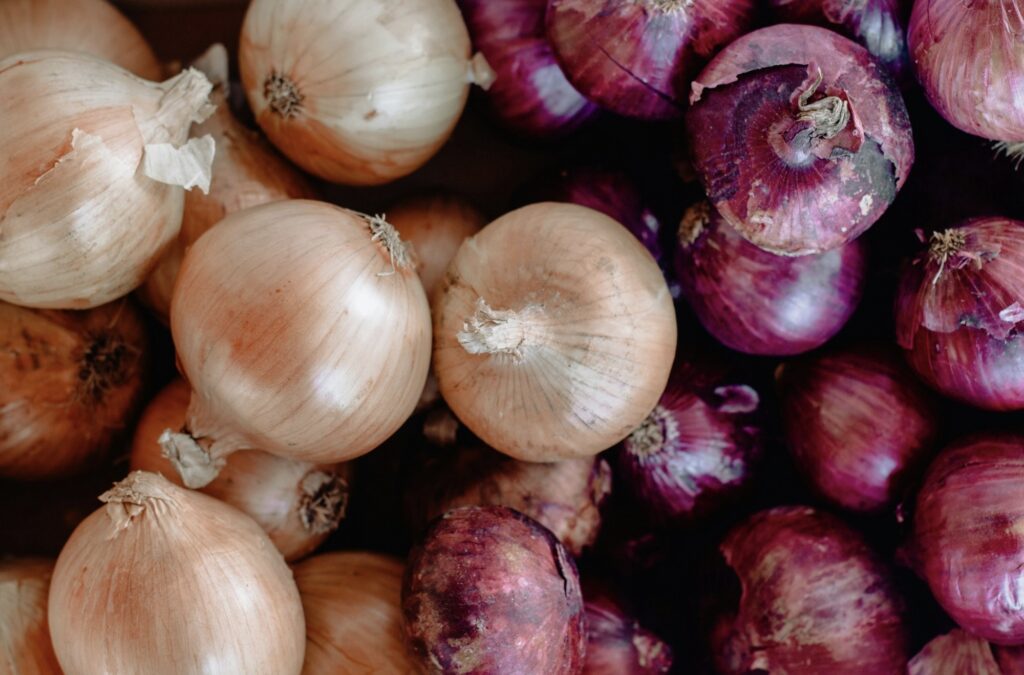
Incorporating nutrient-rich vegetables into our meals can make a significant difference in our health, especially for those living with chronic conditions like lupus. Two powerhouse vegetables that deserve a spot in nearly every dish are bell peppers and onions. Not only do they add vibrant flavors and colors to our meals, but they also offer numerous health benefits that can help manage inflammation and improve overall well-being.

The Benefits of Bell Peppers
Bell peppers come in various colors, including red, yellow, green, and orange, each bringing its own set of nutrients to the table.
- Rich in Nutrients: Bell peppers are packed with vitamins A, C, and E, potassium, folate, and fiber. These nutrients support various bodily functions and help maintain overall health.
- High in Antioxidants: The antioxidants in bell peppers, such as vitamin C and carotenoids, protect the body from oxidative stress and reduce inflammation.
- Supports Immune Health: With high levels of vitamin C, bell peppers boost the immune system, helping the body fend off infections.
- Promotes Eye Health: Carotenoids like lutein and zeaxanthin in bell peppers support eye health and protect against age-related macular degeneration.
- Anti-Inflammatory Properties: The anti-inflammatory compounds in bell peppers can help reduce inflammation, which is particularly beneficial for lupus patients.
- Supports Heart Health: Antioxidants, fiber, and potassium in bell peppers contribute to heart health by lowering cholesterol and regulating blood pressure.
- Aids in Digestion: The dietary fiber in bell peppers promotes healthy digestion and prevents constipation.
- Promotes Skin Health: Vitamin C aids in collagen production, keeping the skin firm and youthful.
- Weight Management: Low in calories and high in water content, bell peppers are an excellent choice for weight management.
The Benefits of Onions

Onions are another versatile vegetable that brings both flavor and health benefits to the table.
- Rich in Nutrients: Onions are a good source of vitamins C, B6, and folate, as well as minerals like potassium and manganese.
- High in Antioxidants: Onions contain flavonoids and sulfur compounds, which have antioxidant properties that protect the body from oxidative damage.
- Anti-Inflammatory Properties: The compounds in onions, such as quercetin, have anti-inflammatory effects, making them beneficial for managing inflammation in lupus patients.
- Supports Immune Health: Onions have antibacterial properties and can boost the immune system, helping to fight off infections.
- Promotes Heart Health: Onions help lower cholesterol levels, reduce blood pressure, and improve overall heart health.
- Aids in Digestion: Onions contain prebiotics that feed beneficial gut bacteria, promoting a healthy digestive system.
- Regulates Blood Sugar: Compounds in onions can help regulate blood sugar levels, which is beneficial for managing diabetes.
- Promotes Bone Health: Onions contain compounds that can help improve bone density and reduce the risk of osteoporosis.
The Little Things Matter
For lupus patients, managing inflammation is crucial, and the little dietary choices we make can have a significant impact. Including bell peppers and onions in your meals can provide anti-inflammatory benefits, support the immune system, and promote overall health. These vegetables are not only delicious but also versatile, making them easy to incorporate into a variety of dishes.
How to Include Bell Peppers and Onions in Your Diet
- Salads: Add raw bell peppers and onions to salads for a crunchy texture and a burst of flavor.
- Stir-Fries: Include them in stir-fries with other vegetables and proteins for a quick and nutritious meal.
- Soups and Stews: Use bell peppers and onions as a base for soups and stews to enhance the flavor and nutrient content.
- Grilled: Grill bell peppers and onions for a delicious side dish or to top your favorite proteins.
- Sandwiches and Wraps: Add sliced bell peppers and onions to sandwiches and wraps for extra crunch and nutrition.
Conclusion
Bell peppers and onions are more than just flavorful additions to your meals—they are nutritional powerhouses that can contribute to better health and help manage conditions like lupus. By making these vegetables a foundation of your diet, you can take small but significant steps toward improving your long-term health. Remember, it’s the little things we do that help more than we realize. So, go ahead and make bell peppers and onions a staple in your kitchen!
Engagement Question:
How do you incorporate bell peppers and onions into your meals? Share your favorite recipes and tips in the comments below!

